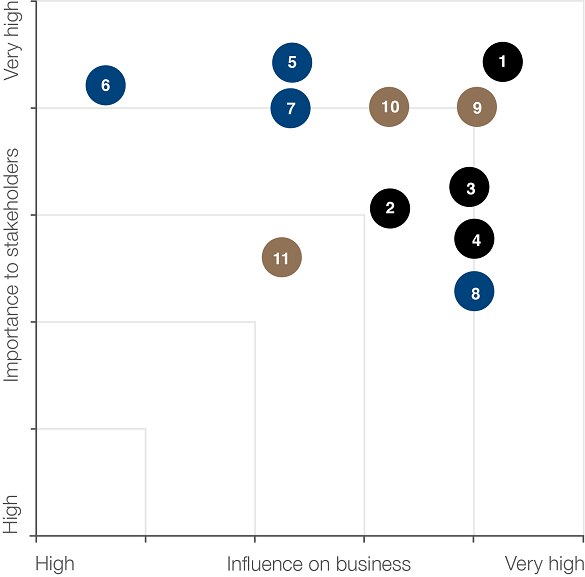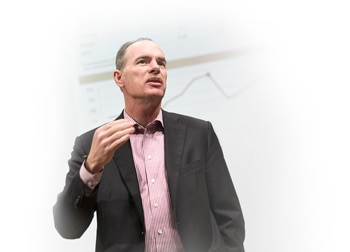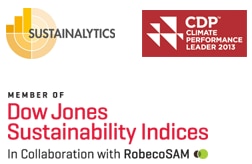Mapping priorities
Reviewing material issues helps the Group focus on what is most significant for Electrolux and its stakeholders.
Materiality – Mapping Priorities

| Products and services | People and operations | Stakeholder and society |
|---|---|---|
| 1 Product efficiency | 5 Operational eco-efficiency | 9 Transparency |
| 2 Chemicals of concern | 6 Ethics and CoC | 10 Responsible sourcing |
| 3 Sales of green products | 7 Health and safety | 11 Restructuring |
| 4 Middle of the pyramid | 8 Integration sustainability |
|
Materiality 2013
Seeing the big picture is important--it is the departure point for understanding the issues that really matter. A number of factors influence and impact the business and wider community. These issues shape the business strategy and determine how sustainability is managed and reported. To identify these, Electrolux draws on product lifecycle analysis, engages in external and internal dialog, conducts surveys and interviews, consults market intelligence reviews and follows a range of media to track trends. Global standards from ISO and the Global Reporting Initiative (GRI) to the UN Guiding Principles on Business and Human Rights are also taken into account.
For several years, Electrolux has conducted assessments based on Accountability’s The Materiality Framework, using a wide universe of possible issues. In 2013, the materiality analysis was updated by Group Sustainability Affairs, mapping topics of highest relevance from a stakeholder and business perspective.
As in previous years, customers, consumers, employees, and shareholders were the Group’s most important stakeholders, with legislators emerging as an increasingly important sustainability constituent. Eleven priority issues were identified as critical to the Group’s work with sustainability. They are addressed throughout this report, together with core indicators as defined by the GRI. The materiality analysis also takes into account emerging and upcoming trends that are relevant for the business over time.
Products, services and markets
In this strategy pillar the most important issues this year were growing middle classes in emerging markets, sales of green products (new issue), phase-out of chemicals of concern and product efficiency.
Stakeholder feedback has been broadly positive on how Electrolux manages its products’ environmental impacts. Interest in climate change is dampening somewhat among the general public, but energy efficiency remains high on the agenda due to increasing energy costs. This is confirmed by the Electrolux brand scorecard consumer research conducted across six major Electrolux markets and the 2013 findings of the IPCC.
Among up-and-coming issues, fluctuations in economic growth and income disparity are having a growing impact on emerging markets, while stakeholder feedback is emphasizing increasing interest in food waste– with implications for product innovation opportunities. Electrolux has engaged in dialog with industry peers on conflict minerals to explore new and emerging legislation and stakeholder expectations for transparency on the source of conflict minerals in the supply chain.
People and operations
Improving efficiency by reducing energy, water, waste and emissions in operations is a topmost organizational concern. Strong focus is also on Ethics and Code of Conduct issues such as freedom of association and health & safety, as well as integrating sustainability into the business (new issue).
Expectations on human rights performance are growing, in part due to external standards such as UN Guiding Principles on Business and Human Rights, and increased Group presence in high-risk regions. Issues around freedom of association and compensation have also arisen, partly due to concerns expressed by stakeholders.
Aligning new operations to Group standards continues to be crucial, which is now incorporated in the issue Ethics and Code of Conduct. Environmental management is an area in which Electrolux was ranked highly by CDP, DJSI and Sustainalytics.
Stakeholders and society
Both stakeholders and the business place huge importance on transparency and accountability. Electrolux considers openness a prerequisite for maintaining sustainability leadership. By extension, being clear and globally consistent in our approach to public policy work is of growing importance.
Taking a responsible approach to sourcing and restructuring is also critically important and a strategic priority for the company.
StopSearchHereCEO Statement

In 2013 we continued to deliver above our growth target and delivered 4.5% in organic sales growth.
CEO Statement

I'm convinced that raising product efficiency for the growing middle class is where long-term shareholder value creation lies.
Our products

Electrolux is the only appliance manufacturer in the industry to offer complete solutions for both consumers and professionals. The focus is on innovative and energy-efficient products in the premium segments.
Sustainability
Achieving the Group's vision of sustainability leadership is crucial to realizing the business strategy. The objective is to develop smarter, more accessible, resource-efficient solutions that meet people's needs and improve their lives. Read the comprehensive sustainability performance review.
Awards & recognition

Financial Reporting
Net sales for the Electrolux Group in 2013 amounted to SEK 109,151m, as against SEK 109,994m in the previous year. The organic sales growth was 4.5%, while currencies had an impact of -5.3%.
